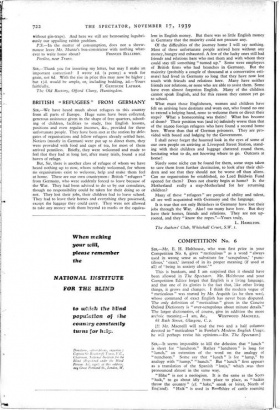BRITISH "REFUGEES" FROM GERMANY
Sia,—We have heard much about refugees to this country from all parts of Europe. Huge sums have been collected, generous assistance given in the shape of free quarters, school- ing of children, facilities to study, free English lessons, positions and even regular incomes, &c., provided for these unfortunate people. They have been met at the station by dele- gates of organisations and fellow refugees already settled here. Notices (mostly in German) were put up to direct them, they were provided with food and cups of tea, for most of them arrived penniless. Briefly, they were welcomed and made to feel that they had at long last, after many trials, found a real haven of refuge.
But, Sir, there is another class of refugee of whom we have heard nothing up to now, whom nobody welcomed, for whom no organisations exist to welcome, help and make them feel at home. These are our own countrymen : British " refugees " from Germany, who were suddenly forced to leave because of the War. They had been advised to do so by our consulates, though no responsibility could be taken for their doing so or not. They lost their jobs, their children had to leave school. They had to leave their homes and everything they possessed, except the luggage they could carry. They were not allowed to take any money with them beyond to marks or the equiva- lent in English money. But there was so little English money in Germany that the majority could not procure any.
Of the difficulties of the journey home I will say nothing. Most of these unfortunate people arrived here without any money, hungry and exhausted. A few of the lucky ones still had friends and relations here who met them and with whom they could stay till something " turned up." Some were employees of British firms who had branches in Germany. But the majority (probably a couple of thousand at a conservative esti- mate) had lived in Germany so long that they have now lost touch with friends and relations here. Many have neither friends nor relations, or none who are able to assist them. Some have even almost forgotten English. Many of the children cannot speak English, and for this reason they cannot yet go to school.
What must those Englishmen, women and children have felt on arriving here destitute and worn out, who found no one to extend a helping hand, none to welcome them or direct their steps? What a homecoming was theirs! What has become of them? Their position was (and is) infinitely worse than that of the 5o,000 foreign refugees who have found a second home here. Worse than that of German prisoners. They are pro- vided with board and lodging by the Government.
I shall never forget the haunted look in the eyes of some of our own people on arriving at Liverpool Street Station, stand- ing with their children and luggage cluttered round them, hesitating what to do, not knowing where to go. Outcasts at home!
Siirely some niche can be found for them, some steps taken to save them from further destitution, to look after their chil- dren and see that they should not be worse off than aliens. Can no organisation be established, no Lord Baldwin Fund opened for them? Does not charity begin at home? Is the Motherland really a step-Motherland for her returning children?
Many of these " refugees " are people of ability and talent, all are well acquainted with Germany and the language.
It is true that not only Britishers in Germany have lost their jobs through the War. Alas! too many have here. But they have their homes, friends and relations. They are not up- rooted, and they " know the ropes."—Yours truly,




































































 Previous page
Previous page